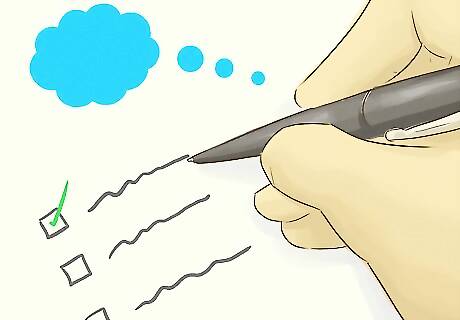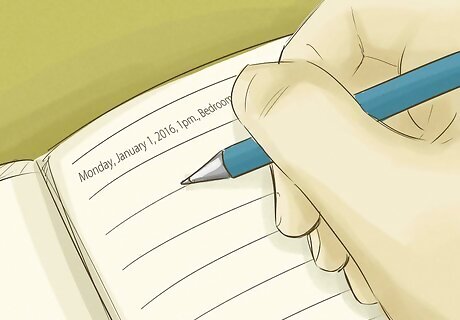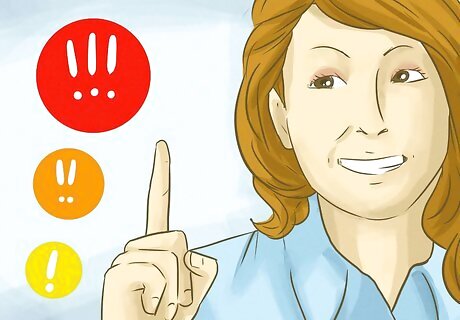
views
Accepting Your Present Situation

Identify denial. Accepting your situation doesn’t mean you have to like it or that you support the conditions that lead you there. Refusing to accept your current life, though, can have major consequences on your mental and physical health, leading to anxiety, chronic physical pain, or bodily harm caused by escapist behaviors like eating unhealthy foods or drinking too much alcohol. If you are in a situation that affects your well-being, then you might be using denial to cope with your feelings. You may need to seek professional help for certain types of denial, such as if you are in an abusive relationship or if you are addicted to drugs or alcohol. Try talking to a trustworthy friend to start moving towards acceptance and then find some tailored help for your situation. For example, if you have been denying that you have a problem controlling your drinking, but you drink on a daily basis and can’t stop once you start, then you may need to admit you have a problem and enter a treatment program. If you have been denying that there is anything wrong with your relationship even though you have a verbally abusive partner, then you might need to ask your partner to visit a couples’ counselor with you.

Practice radical acceptance. Denying a situation will not make it cease to exist. Denying can also have negative consequences, such as leading you to feel depressed or anxious. Some people also turn to substances to escape the pain caused by denying a situation. That is why the best way to move towards healing is to practice radical acceptance of a situation. Try creating an acceptance mantra for yourself and repeat it several times daily or whenever you have thoughts of denial. For example, you can say something like, “This is the situation. I may not like it, but I can’t change it.”

Identify your part in creating your situation. To fully accept some situations, it is important to acknowledge the role that you played in causing the problem. Ask yourself questions related to your particular situation to help you work towards solutions. If you are overweight and wish you weighed less, think about the reasons you are overweight. Do you eat a healthy diet of natural vegetables, fruits, legumes, and grains? Do you exercise regularly? If not, is there a valid medical reason why you cannot exercise in certain ways, and are there other types you could do instead? If you are unhappy with a relationship, consider why you continue to stay with this person. Are you afraid that you might end up alone? Do you worry that separating or divorcing will lead to financial problems? If you hate your job, ask yourself why you continue to work there. Do you need more education or training to do what you really want to do? And if so, why haven’t you gotten it yet? Are there other jobs you could be applying for? Are you staying because it is convenient, even if unhealthy for your well-being?

Think about what you would like your life to be like. Planning for a more positive future may help you to accept the situation you are in now and it can also give you something to look forward to. Consider what your ideal situation would be and write down some notes about what this ideal future might look like. For example, if you are in an abusive relationship, then you might imagine a future with a partner who is kind, caring, and loving towards you. If you are consumed by grief over the death of a loved one, then you might imagine feeling peace over your loss and celebrating your loved one’s memory in a positive way.
Working Through Your Feelings

Write in a journal. Journaling can help you to get through difficult situations and process your emotions. Journaling can also benefit your physical health and reduce stress. Especially with emotional situations, like losing someone you love or realizing you don’t want to be a doctor after three years of medical school, facing the reality of your present situation changing so drastically is hard and takes time. Writing it down helps you acknowledge that the situation is real. If you already keep a journal, continue writing daily and add a new component such as a list of things you are grateful for every day. Or, write about your day as usual and then add a reflection of what you did that day to change your situation. If you have a difficult decision to make, journaling can help you get clear on what you really want, and it may make it easier to separate emotions from facts.

Practice mindfulness. Mindfulness can help to reduce the amount of time that you spend ruminating. That means that it can prevent you from dwelling so much on the negative aspects of your situation. Among other benefits, practicing mindfulness is also a powerful way to relieve stress and it can improve your ability to focus. You can practice mindfulness as you do daily activities, such as brushing your teeth or washing the dishes. For example, as you brush your teeth, focus on the sound of the toothbrush, the feeling of the bristles, and the taste of the peppermint toothpaste. When you are doing dishes, think about the temperature of the water, the sounds you hear, the smell of the dish soap, and how you move your hands as you wash. Be present in the experience of doing the dishes instead of thinking about all the other things you need to do. If you start to feel overwhelmed, take several slow, deep breaths to bring yourself back into your body and the present moment.

Express gratitude for what you have. Whether you start a gratitude journal, or just write three to five things you are grateful for on a dry-erase board every morning, start making it a daily practice to reflect on what you have instead of what you think you are missing. Gratitude can help you to let go of emotions such as regret, resentment, and frustration. Start out by jotting down basic things that make you feel grateful, such as having a place to live, clothes on your back, a good friend, or nice meal. As your list builds, look for smaller things that make you feel grateful, such as a beautiful sunset, a good cup of coffee, or sharing a laugh with a friend.

Challenge negative thoughts. Replacing negative thoughts with positive ones is a good way to help yourself feel better. Whenever you have a negative thought, try to replace it with a positive version of that thought. If someone you love passes away, and you constantly think that your life will never be happy again, then this can affect your outlook on life. To counteract these thoughts, you might tell yourself something like, “I will experience love and happiness again.” Or, if you have lost your job and money is tight, then you might focus on something positive that you are doing to improve your situation, such as, “I am learning effective ways to manage the money that I have.”

Practice self-soothing. Self-soothing is an important part of managing your emotions on a day-to-day basis. You might be feeling anxious, overwhelmed, angry, or just frustrated in general. To cope with the emotions you are feeling, you can use self-soothing strategies. Identify self-soothing activities that work for you and use them as needed. Try taking a bubble bath, watching a funny movie, or sipping a cup of tea when you are feeling sad or lonely. If you are feeling angry or anxious, then taking a long walk or going for a bike ride might be a good way to self-soothe.
Creating a Better Future

Focus on what you can control. You can plan out your whole day ahead of time to go as smoothly and successfully as possible, but get a flat tire on the way to work that throws off your whole schedule. Adapting to changes like this and keeping your focus on how to alter your schedule can help you remain positive and mindful the rest of your day instead of feeling resentful or helpless. Learn how to tell the difference between what you can and cannot control to help you move forward with your life. Remember that you cannot control what other people do, but you have complete control over how you react to everything around you. Your emotions are solely your responsibility. Reflect on things that contributed to your current position. What could you have done differently then? Can you use this experience to apply such lessons to your future behaviors and actions to make sure you don’t repeat yourself?

Decide what you want for yourself in the future. Since you have been able to fully assess and accept your current situation and what you don’t like about it, as well as how your actions contributed to creating it, you can now decide how you want your life to be different in the future. Think of a general goal and then come up with a definite smaller goal that will help you get there. Do you want to find a new job, lose a healthy amount of weight, learn to better handle your finances, or develop stronger and healthier relationship skills? If you want a new job, do you need more training or education? Do you need to start practicing for interviews and hiring a resume consultant? Will you start spending an hour every morning looking through want-ads? If your goal is to lose weight, for example, focus on specific goals you can obtain in the near future, such as “I will walk for 30 minutes every day this week.” Try writing down your goals in a to-do list. That can help make your plan more concrete, and it may be easier to take action.

Make a plan for reaching your goal. Include steps you will take to get there, how you plan to recognize and change negative thought patterns as they come up, and what you will do if you hit a stumbling block. Break your goal into small steps that you can accomplish one at a time to build your confidence and self-worth as you go. For example, if your goal is to stick to your budget for the next 30 days, then identify ways that you can do that. You might plan to make a grocery list and stick to it. Or, to cut out spending on extras such as entertainment. You might also plan for potential obstacles, such as an unexpected bill. Perhaps there is a way you can make $50 quickly if an emergency arises. Do you have anything valuable to sell on eBay? Can you work a few extra hours at your job or pick up a shift from someone? Can you set aside an emergency fund for unexpected expenses?




















Comments
0 comment